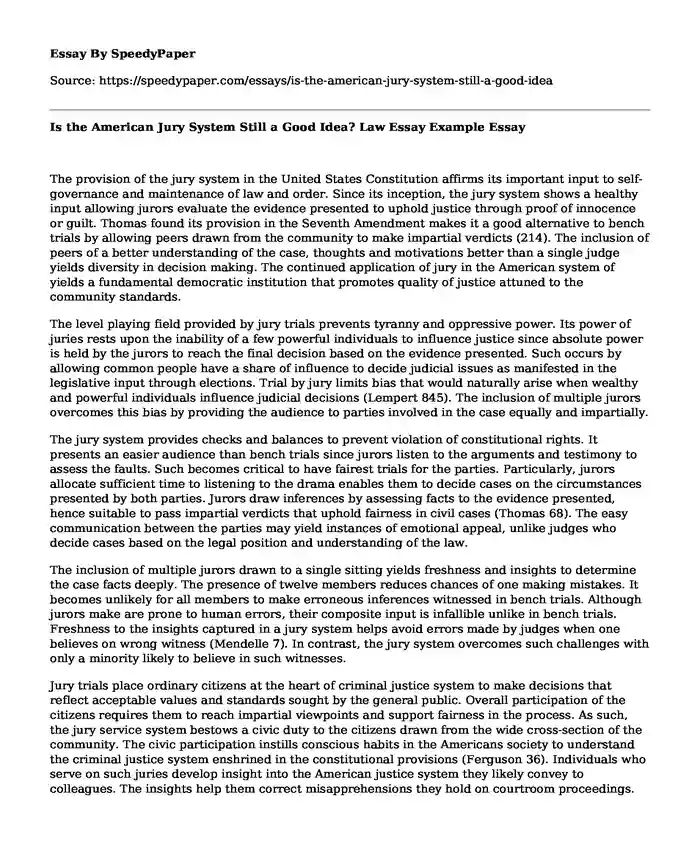
| Type of paper: | Essay |
| Categories: | United States Law |
| Pages: | 3 |
| Wordcount: | 773 words |
The provision of the jury system in the United States Constitution affirms its important input to self-governance and maintenance of law and order. Since its inception, the jury system shows a healthy input allowing jurors evaluate the evidence presented to uphold justice through proof of innocence or guilt. Thomas found its provision in the Seventh Amendment makes it a good alternative to bench trials by allowing peers drawn from the community to make impartial verdicts (214). The inclusion of peers of a better understanding of the case, thoughts and motivations better than a single judge yields diversity in decision making. The continued application of jury in the American system of yields a fundamental democratic institution that promotes quality of justice attuned to the community standards.
The level playing field provided by jury trials prevents tyranny and oppressive power. Its power of juries rests upon the inability of a few powerful individuals to influence justice since absolute power is held by the jurors to reach the final decision based on the evidence presented. Such occurs by allowing common people have a share of influence to decide judicial issues as manifested in the legislative input through elections. Trial by jury limits bias that would naturally arise when wealthy and powerful individuals influence judicial decisions (Lempert 845). The inclusion of multiple jurors overcomes this bias by providing the audience to parties involved in the case equally and impartially.
The jury system provides checks and balances to prevent violation of constitutional rights. It presents an easier audience than bench trials since jurors listen to the arguments and testimony to assess the faults. Such becomes critical to have fairest trials for the parties. Particularly, jurors allocate sufficient time to listening to the drama enables them to decide cases on the circumstances presented by both parties. Jurors draw inferences by assessing facts to the evidence presented, hence suitable to pass impartial verdicts that uphold fairness in civil cases (Thomas 68). The easy communication between the parties may yield instances of emotional appeal, unlike judges who decide cases based on the legal position and understanding of the law.
The inclusion of multiple jurors drawn to a single sitting yields freshness and insights to determine the case facts deeply. The presence of twelve members reduces chances of one making mistakes. It becomes unlikely for all members to make erroneous inferences witnessed in bench trials. Although jurors make are prone to human errors, their composite input is infallible unlike in bench trials. Freshness to the insights captured in a jury system helps avoid errors made by judges when one believes on wrong witness (Mendelle 7). In contrast, the jury system overcomes such challenges with only a minority likely to believe in such witnesses.
Jury trials place ordinary citizens at the heart of criminal justice system to make decisions that reflect acceptable values and standards sought by the general public. Overall participation of the citizens requires them to reach impartial viewpoints and support fairness in the process. As such, the jury service system bestows a civic duty to the citizens drawn from the wide cross-section of the community. The civic participation instills conscious habits in the Americans society to understand the criminal justice system enshrined in the constitutional provisions (Ferguson 36). Individuals who serve on such juries develop insight into the American justice system they likely convey to colleagues. The insights help them correct misapprehensions they hold on courtroom proceedings. The civic participation stimulates accountability to uphold fairness and impartiality, thereby improving justice quality by attuning the American society to the community standards.
In conclusion, the jury system enhances the quality of justice beyond prove of innocence and guilt in cases. It offers checks and balances through healthy trials to address the violation of constitutional rights. The inclusion of ordinary citizens gives them absolute power to prevent tyranny and oppressive power. Jury trials enhance civic participation for ordinary systems through opportunities for self-governance and perpetuate laws in the society. Besides educating jurors and correcting misapprehensions, continued application of jury trials offers a peaceful dispute resolution option through the quality of justice attuned to the community standards.
Works Cited
Ferguson, Andrew G. Why Jury Duty Matters: A Citizen's Guide to Constitutional Action. New York University Press, 2013.
Lempert, Richard. "The American Jury System: A Synthetic Overview." Chicago-Kent Law Review, vol. 90, no.3, 2015, pp. 825-861.
Mendelle, Paul. "Why Juries Work Best." The Guardian, 2010, www.theguardian.com/commentisfree/2010/feb/21/juries-work-best-research. Accessed 15 April 2018.
Thomas, George C. The Supreme Court on Trial: How the American Justice System Sacrifices. University of Michigan Press, 2010.
Thomas, Suja A. The Missing American Jury: Restoring the Fundamental Constitutional Role of the Criminal, Civil and Grand Juries. Cambridge University Press, 2016.
Cite this page
Is the American Jury System Still a Good Idea? Law Essay Example. (2022, May 09). Retrieved from https://speedypaper.net/essays/is-the-american-jury-system-still-a-good-idea
Request Removal
If you are the original author of this essay and no longer wish to have it published on the SpeedyPaper website, please click below to request its removal:
- Essay Example about Cognitive Behavioral Therapy in the US
- Airline Industry Research Paper Example on the AirAsia X Company
- Essay Example on Designing Modern Transport System Friendly to Pedestrian
- Article Reading Essay Sample on Toxicology
- Literary Essay about the Setting of The Story of an Hour
- Essay Sample on Women and Work
- Paper Example on Unveiling Racism: Individual and Institutional Struggles in the United States
Popular categories




